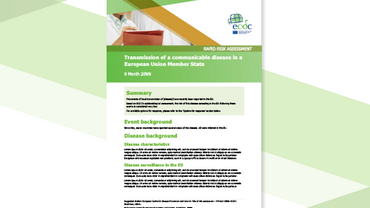Rapid Risk Assessment: Outbreak of Ebola virus disease in West Africa - fourth update, 3 September 2014
ECDC have published a fourth update of the rapid risk assessment concerning the outbreak of Ebola virus disease in West Africa. This is to update the risk of importation and transmission of Ebola virus disease to the EU associated with the outbreak in West Africa currently affecting Guinea, Liberia, Sierra Leone and Nigeria.
Executive Summary
ECDC has updated its Rapid Risk Assessment (RRA) on the Ebola virus disease outbreak in West Africa given the accelerating spread of the outbreak. The RRA summarises the known epidemiological situation, assesses the risk to Europe and outlines the options for risk reduction.
The risk of Ebola infection for EU residents and visitors to affected countries is considered low, if recommended precautions are taken. There is also an extremely low risk of onward spread of Ebola from a patient arriving in EU as result of a planned medical evacuation. While the secondary transmission of Ebola from a symptomatic patient to family and healthcare providers is possible, recognising Ebola cases and taking precautions by healthcare providers to stop transmission reduce the risk of onward spread to a minimum.
As of 26 August 2014, 3 070 cases of Ebola virus disease (EVD), including 1 553 deaths have been reported by the World Health Organization (WHO) in the affected countries - Guinea, Liberia, Sierra Leone and Nigeria. Senegal is not considered an affected country despite one EVD diagnosis as there have been no reports of local transmission. The most affected rural areas during the past three weeks are cross-border areas of Gueckedou (Guinea), Lofa (Liberia) and Kenema and Kailahun (Sierra Leone).
Transmission in the capital cities is of particular concern, owing to their population density and the repercussions for travel and trade.
The evolving outbreak of EVD over the last weeks increases the likelihood that residents and travellers to the EVD-affected countries will be exposed to infected or ill persons. The risk of infection for residents and visitors to the affected countries through exposure in the community is considered low if they follow the recommended precautions.
Risk to Europe
The RRA considers three main risks for EU/EEA: risk of someone from the EU being infected in the affected countries; risk of importation of Ebola virus into Europe and the risk of onward transmission should it be imported.
The risk of infection for EU residents and visitors to the affected countries can be reduced by strictly following the EVD prevention measures. As there is an increased risk of infection in healthcare facilities, those planning to travel can reduce the risk of infection by identifying appropriate in-country healthcare resources prior to travelling.
The risk of Ebola viruses spreading from an EVD patient who arrives in the EU as result of a planned medical evacuation is considered extremely low. Should a person infected with Ebola virus and showing symptoms, ie are infectious, appear in Europe, secondary transmission to caregivers in the family and in healthcare facilities cannot be ruled out. Once the possibility of EVD has been recognised and healthcare providers have taken precautions to stop transmission, the risk of spread is reduced to a minimum.
An imported case of EVD into Europe may not be unexpected as the outbreak continues and increases.
The WHO has already issued recommendations according to the declared Public Health Event of International Concern (PHEIC) that should limit the risk of exported cases from affected countries. The screening at the point of departure (exit screening) in affected countries is likely to be more effective and less costly than performing screening at point of entries in EU/EEA countries. Therefore, entry screening in the EU should only be considered for direct flights originating from affected countries where there is no evidence of effective exit screening.
The risk of Ebola virus arriving in the EU will not be eliminated until transmission stops in affected countries and there is urgent need for substantial international support to bring this outbreak under control.





